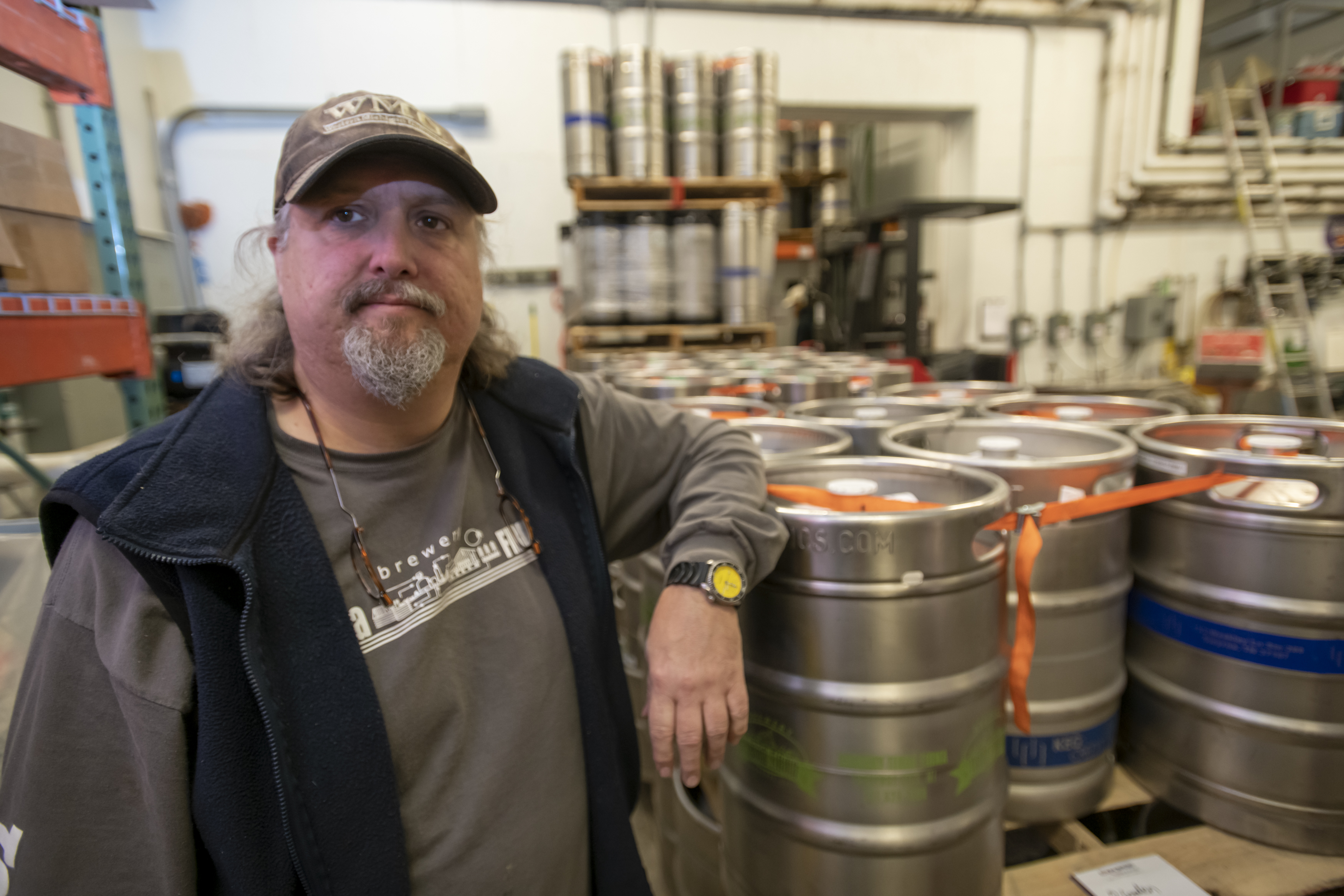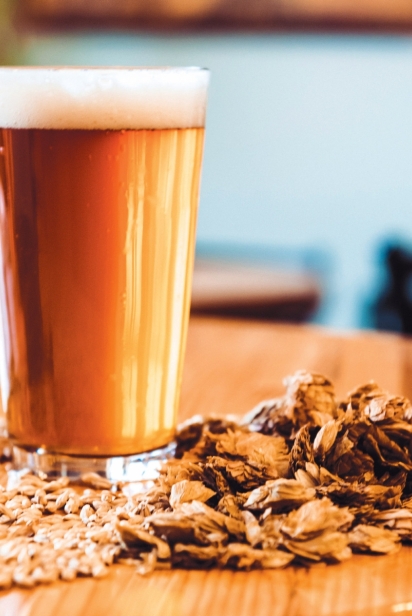On Solid Ground: Brewery Terra Firma
John Niedermaier is a man firmly planted in the world of beer. He is a farmer at heart, a brewer by trade and creator of Brewery Terra Firma, an estate-based, enviro-friendly production craft brew house and taproom in the southern reaches of Traverse City.
John, at 54 years old, is tall, sturdy and relaxed. He seems comfortable in his rubber boots—whether he’s wearing them inside on brewing days while wrangling the malt in the mash tuns, or outside checking on his beehives and walking the fields of barley. Somehow that easiness seems at odds with the years of work, hard knocks and financial stress that one can imagine it took to get to this stage of business. Then again, work and pleasure often cross paths for both artisans and farmers. And if the road has been rugged, the reward seems to be that of finding himself finally in the right place, doing what he wants to do.
WILLIAMSBURG BEGINNINGS
It wasn’t that long ago in this country when there was no craft beer or pub scene; back then, if you wanted something other than a Budweiser, Heineken or your region’s other big beer, you pretty much had to DIY it. John started as a homebrewer then, and became part of the first wave of Michigan microbrewers when in 1997 he joined Traverse Brewing Company in Williamsburg.
A year earlier, Traverse Brewing had launched local production of Manitou Amber Ale, the first commercial beer brewed in Northern Michigan since Prohibition. In order to convince a bank that people would actually buy the stuff, for the prior two years they had Manitou custom brewed in Pennsylvania and shipped to Williamsburg for sale. They got the loans; Manitou became the brewery’s flagship beer and for many years dominated sales of local craft beers.
Traverse Brewing had a good run and John became an integral part of their operation and of the local beer scene. There he worked with both Joe Short, now of Short’s Brewing, and Russell Springsteen, now of Right Brain Brewery, as they passed through on shorter job stints. Eventually though, saddled with too much debt and the costs of creating a market share against the big guys, Traverse Brewing reluctantly closed its doors.
“That was before this whole craft beer thing exploded,” says John. “We were hoping it would get more popular, but none of us really saw it coming like it eventually did.” Nonetheless, John acquired the recipes and equipment, because he had also acquired a dream— and plans—for his own brewery. That brewery would be on a farm and would be called Terra Firma.
The idea of a brewery-farm had been incubated over years of a close relationship with Jack Archiable, TBC’s founder and manager, and Tom Priest, Jack’s friend and a lover of stout, a potter and owner of a landscaping business. On a bit of extra land out back of the brewery Tom started growing out some of his nursery plants. He saw the spent grains from the beer making and started using them as mulch on the expanding beds. Then he’d tear up the cardboard from the packing line, lay that down, and pile on more spent grains. Those mulch materials broke down into beautiful soil.
“Tom would say ‘I’m just winging it, but it’s working. Look at how these plants are doing—unbelievable,’” says John. “We had a couple summers where we had really bad drought, and his garden was like a Tarzan movie, it was just great.”
According to John, Tom never stopped working. “You couldn’t get him to. He would come by the brewery at 10 after working all day, put a light on his head, ask for a stout, and work in the garden.” On some of those evenings the three would enjoy a beer, admire the plants and talk farming. John asked them if they thought you could make sense of a brewery on a farm and soft-spoken Tom said quietly, “Yes. I think you could.”
NEXT STEPS
That may seem a long story, but it is how Brewery Terra Firma came to be, when there was nothing else like it to show the way. John worked on business plans while trying to save Traverse Brewing, he worked on them still while later brewing for Right Brain in Traverse City—but he wasn’t finding the land. The Williamsburg site had been woodsy and too small—he knew he needed at least ten acres, also with some structures and within 15 minutes of downtown.
The right property was an unusual one that had been on the market for a while when he found it: ten acres in Garfield township, just south of South Airport Road, between Cass and Division streets, with a barn, a house that had been a B&B, and big open fields. Developers began to circle and John had to buy the land before he could confirm that zoning would accept his plans.
“It was a risk,” says John. “No one had heard of a farm brewery before. But we were proposing to take all our waste and turn it back on the farm, where all the other breweries were dumping into the sewage system and waste treatment plant.” He credits the township for putting their time and resources into understanding the project, rezoning and allowing the project to move ahead.
GREEN ACRES IS THE PLACE TO BE
In 2012 the new production facility and taproom broke ground. This needed to be built from scratch because the green-energy and resource-recycling aspects of the brewery were integral to the whole concept—not just afterthoughts or add-ons. They get electric service from the city but no water or sewer. An artesian well provides water with a pump that assists the natural pressure as needed. They have a license from the DEQ to land-apply their brewery waste, after analysis. Wastewater gets pumped out to the fields and with all that fertigation, John says, “Stuff grows crazy fast.” The more solid waste—largely grains and hops—is spread as-is in the warmer seasons and held in composting piles during the cold, snowy times.
The whole facility is warmed by heat exchanging systems. Heat pulled from cooling worts in the brewhouse is used to preheat water for the next batch of beer. Other waste heat is captured by heat exchangers and sent through the in-floor heating system. The furnace only kicks on when it gets below 19 degrees outside. That concrete floor in the taproom does indeed feel cozy and warm. Bold and colorful label art by Kris Love hangs on the walls and lots of big windows keep the space bright and airy. While the building’s primary purpose was for brewing, shipping and receiving, “We wanted to make sure people had a place to go; and we wanted to keep it simple,” says John.
So now people find their way to Brewery Terra Firma to enjoy the fresh beer. There are flagship beers and a host of rapidly rotating seasonal beers, a cider and the infused beers that are used for the Traverse City Pour For More program. Decorative kegs camouflage a sound system that is “way overbuilt” for the room but makes for great vinyl nights. People nibble on snacks available from the bar, have pizza delivered or bring cakes for birthday parties. They come after work, for celebrations, meetings and as a second living room when company comes to town. John calls it, affectionately, “A dysfunctional community center.”
But he also wants people to understand the story behind the beer. “You know, they come in for a glass of beer and they don’t know about the farming. We put a lot of extra effort into letting people know we are doing more. Our social media posts on Earth Day and St. Pat’s Day turn out to be the biggest posts we do all year because we talk about our green initiatives.”
PRODUCTION
Back in the production rooms it is all business. Hoseable concrete floors, huge copper and steel tanks, pallets of empty cans, bags of barley—most of what you need for beer. A small storage area emits the relaxing aromas of dried hop cones—that distinct medley of spruce, fruit, flowers and resin. The space is airy and John says it was designed for eventual expansion: When the time comes to make bigger batches of beer, the roof will be lifted and the building will grow upward to accommodate larger equipment. For now, John is using much of the equipment that he bought from Traverse Brewing and managing to keep up with his orders.
The demand is growing rapidly, though. Brewery Terra Firma’s flagship beer, and first in distribution, is the Manitou Amber Ale carried over from Traverse Brewing. John has been faithful to the original recipe, including using whole-cone Columbia hops for aroma, now estate-grown. Distribution covers the entire state of Michigan at big chain stores, party stores, restaurants and bars; four other varieties have joined the growing list and are picking up sales quickly.
Beyond the bestsellers there are at least a dozen beers on tap at any one time, and countless recipes are standing by to rotate in. Like the Fuzzier Farmer IPA, 10 percent ABV, that recently replaced the Fuzzy Farmer 8-Day IPA, 7 percent. The long list suits John’s need for creative expression, but comes at a cost, he says. “When something runs out people bug me for more. Then I put something else on and they bug me for more of that.” But that’s known as a good problem to have and he knows it.
The classic styles are joined by a long list of originals using complementary components that draw on John’s love of food and cooking. He balances new flavors with the body, sweetness, hops and essential grains of the brew much as chefs create and balance their sauces. Beets, mint, honey, pumpkin, blueberries and wheat are among those ingredients grown on the estate or by neighboring farmers like Robbins Family Farm and Grand Traverse Culinary Oils.
THE FARM
The farm itself has been coming along well, if a little more slowly than originally planned because brewing needs must always come first. Still, there are two hopyards on the place. The first one was planted two years before opening the doors, when a friend threatened to throw away over 200 hop plants if John wouldn’t take them in. He took them.
With 12 varieties, the hops from that field are used in a variety of beers including one called Indigenous Wet Hop IPA that takes a specific varietal blend. The newer yard is all Columbia and Cascade hops largely dedicated to making the Manitou. The beehives have been there for years, harvested with help from Travis at Cherry Bee in Rapid City. Every year they grow pumpkins—and in case of crop failure, like last year, it’s been a boon to have neighbors like the Robbinses to fill in that gap. And every year the soil samples show steady growth in soil quality from the addition of nutrients from the brewery.
2019 was a true break-out growing season for the farm, with its first barley and mustard seed harvests both successful. The two-acre mustard field was grown in cooperation with Bill Koucky for his new culinary mustard line as part of Grand Traverse Culinary Oils. That field in flower was a brilliant yellow sward and, so near to the hives, provided a festival—and huge source of nectar—for the bees. John says it was a real sight. “It was like Vegas, man. It was a real party in that field.”
But the barley was the crowning achievement; just over three acres in the field to the east of the taproom. Working closely with Great Lakes Malting in Traverse City, John let Jeff Malkiewicz there choose a variety called Odyssey, a productive two-row barley adapted well to the Upper Midwest. Due to a wet spring the seed got in a little late but matured well. With a new-to-the-farm vintage combine (also used for the mustard harvest), harvest day was September 21, with brewery friends pitching in for the historic event. After harvest the barley went down the road to Grand Traverse Culinary Oils for drying and in November it was run across the street for malting. The malt was bagged and brought back home to the brewery on a journey that ran up a total of 3.3 miles on a truck odometer, door to door to door.
From there it was up to John to craft a celebration brew worthy of the long road taken to get this this point. There was enough malt for one batch of beer. He chose a Belgian Tripel style for its emphasis on malt character and named it after Father Theodore, a renowned monk from the famous Chimay Brewery. The Theodore Belgian Trippel 9 percent is richly golden from a bounty of estate-grown Pilsner malt, full of fruity and complex flavors from selected yeast and grounded in place with a pleasing base of hop bitterness.
FULL CIRCLE
If this Tripel is such an accomplishment, does that mean Brewery Terra Firma is all about the beer? Or is it all about being the farm that makes the beer? What about the green energy systems? Well, in a closed-loop system it’s all about everything working together. And while production from ten acres is not going to provide all the grain and other ingredients for a high-production craft brewery, it does take all of the waste products and turn them into ever more fertile soil. The soil in turn feeds plants that support pollinators and some of those make honey. The rich land creates opportunities for working with neighbors and other brewery-aligned businesses, which builds a robust support system and resilience in the face of challenges. And sales growth from the brewery will eventually help pay for farm management and labor to keep the cycle moving.
For John Niedermaier, that means he can keep on doing what he likes to do. He likes food and he likes brewing and talking about great beer. He likes having work that isn’t a routine but is a way of life that keeps him hands-on with living things like yeast and bees and plants. He enjoys the company of business associates and patrons who are curious about such things, too, and who also enjoy great beer. Tom, his farming mentor from decades ago, died of lung cancer some years back, but the idea he sparked has kept growing, both bigger and deeper. With Brewery Terra Firma John has landed himself on solid ground and he is looking forward to keeping it that way.
IF YOU GO:
Brewery Terra Firma
2959 Hartman Rd., Traverse City
231-929-1600 • BreweryTerraFirma.com






